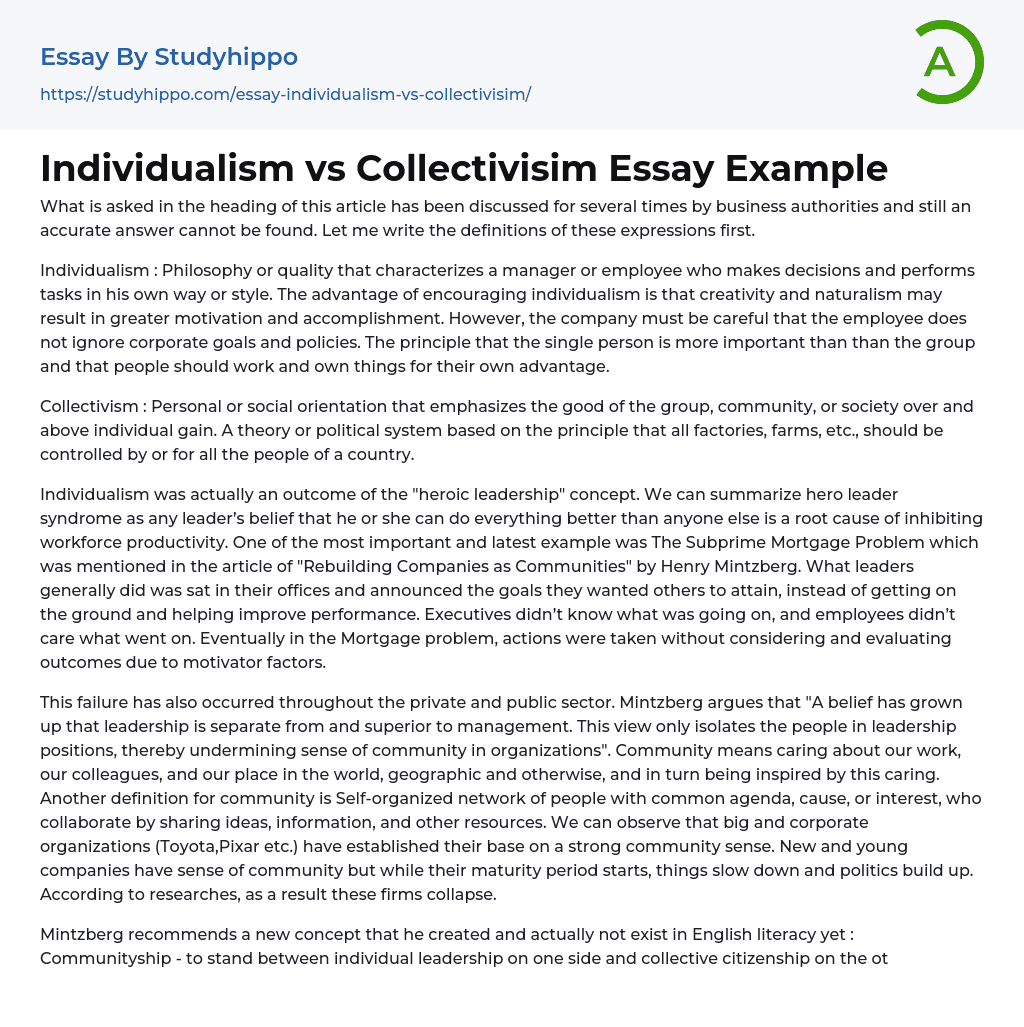The question posed by the heading of this article has been widely debated by business authorities, yet a definitive answer remains elusive. To start, let's establish the definitions of these terms.
Individualism refers to a philosophy or quality that characterizes a manager or employee who operates and makes decisions in their own distinct manner. Promoting individualism can result in heightened motivation and accomplishment by fostering creativity and natural expression. Nonetheless, it is crucial for the company to ensure that employees do not neglect corporate objectives and policies. Individualism underscores the significance of personal interests and success over group considerations, advocating for individuals to work and possess for their own gain.
Collectivism is the belief in prioritizing the welfare of the group, community, or society above individual gain. It encompasses a theory or politi
...cal system that promotes the control of all factories, farms, and other production resources by or for the entire population of a nation.
The concept of "heroic leadership" leads to individualism, hindering workforce productivity. Henry Mintzberg's article "Rebuilding Companies as Communities" discusses the syndrome of hero leader, where leaders believe they are better than anyone else at everything. This was observed in The Subprime Mortgage Problem, where executives would sit in their offices and announce goals without actively participating or assisting with performance improvement. As a result, employees became disengaged and executives were unaware of what was happening. Motivating factors led to actions being taken without considering outcomes.
In both the private and public sectors, there is a failure to recognize the importance of leadership in management. According to Mintzberg, this belief isolates leaders and weakens th
sense of community within organizations. Community refers to caring about our work, colleagues, and our place in the world, both geographically and in other aspects. It inspires us and can be seen as a self-organized network where individuals with shared agendas collaborate by sharing ideas, information, and resources. Large corporations like Toyota and Pixar have successfully established strong communities. However, smaller and newer companies may initially have a sense of community but tend to lose it over time during their growth stage, leading to office politics. Research shows that this ultimately results in the collapse of these firms.
Mintzberg introduces the concept of Communityship, which links individual leadership and collective citizenship. This idea promotes humble leadership through engaged and distributed management. By embracing this approach, we can shift away from "Heroic Leadership" towards "Just enough Leadership," inspiring proactive behavior in individuals within the organization.
Listed below are the 5 topics that need to be followed to turn the company from heroin leadership concept to engaged management:
To begin community building in an organization, it is most effective to create small groups consisting of dedicated managers.
The managers in these groups develop a sense of community through reflecting on their shared experiences within the organization.
What managers need most is to take a moment to slow down and reflect.
3) These reflections lead to insights that can initiate small initiatives, which have the potential to develop into substantial strategies.
The seed of an idea, when held by engaged individuals who possess a comprehensive understanding of both the operational details and the broader scope, has the potential to evolve
into a substantial strategy or organizational transformation.
4) When these initial teams promote change, they serve as role models for other groups within the organization, encouraging the spread of communityship.
5) When its members engage in socially active, responsible, and mutually beneficial actions with the broader community, an organization recognizes that communityship has been firmly established.
Social responsibility projects aim to fulfill the obligations and duties that organizations have towards society.
Bill Taylor argues in "We is bigger than Me" that true happiness and genuine satisfaction do not come from finding oneself, but from losing oneself in a company worth fighting for. He cites the example of Arkadi Kuhlman, the chairman and president of ING Direct USA, who prioritizes the cause he and his colleagues believe in over individual importance.
To summarize, there is a growing acceptance of collectivism or "communityship" in organizations, wherein individuals prioritize their personal lives. This change is evident with the increasing popularity of social media.
- Being A Leader essays
- Servant Leadership essays
- Leadership Experience essays
- Leadership Qualities essays
- Caste System essays
- Citizenship essays
- Civil Society essays
- Community essays
- Culture essays
- Deviance essays
- Discourse Community essays
- Female essays
- Filipino People essays
- Igbo People essays
- Indigenous Australians essays
- Indigenous Peoples essays
- Men essays
- Middle Class essays
- Minority Group essays
- Modern Society essays
- Popularity essays
- Social Control essays
- Social Institution essays
- Social Justice essays
- Social Norms essays
- Social Responsibility essays
- Socialization essays
- The nation essays
- Acceptance essays
- Age Of Enlightenment essays
- Child Observation essays
- Confucianism essays
- Conscience essays
- Critical Reflection essays
- Destiny essays
- Determinism essays
- Empiricism essays
- Environmentalism essays
- Epistemology essays
- Ethics essays
- Ethos essays
- Existence essays
- Existentialism essays
- Fate essays
- Free Will essays
- Functionalism essays
- Future essays
- Good And Evil essays
- Human Nature essays
- Individualism essays




